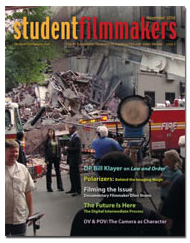Check out this
article in the print edition of StudentFilmmakers
Magazine, November 2006. More behind-the-scenes photos
in the print version. Click
here to get a copy and to subscribe >>
 Ben
Wu Discusses Shooting Docs On DV Ben
Wu Discusses Shooting Docs On DV
Cross Your Eyes Keep Them Wide
...Continued
from Previous Page
What was your movie�s budget? How did you come up with
funding for your project?
Ben Wu: The budget was roughly $4500. It was
great doing something local � when a few of my classmates decided
to do their thesis projects out of state, it really affected their
budgets. The budget covered meals, gas, and a lot of post-production,
i.e., musical score, sound mixing, color correction, things like
that. I got a small grant, but other than that it was primarily
out of pocket. Ouch.
What was the hardest part about making this documentary?
Ben Wu: For me, the most difficult aspect of
this film was making sure I was able to establish a good relationship
with my subjects. That was one of the real benefits of doing a
project that took place so close to home. I was able to spend
a lot of time with my subjects, getting to know who they were,
how they worked, what they�re interested in. We became friends,
and we felt very comfortable with each other. I spent about a
month during pre-production, just coming in and hanging out, before
ever bringing in a camera. So by the time I brought in the camera,
my subjects knew what I was trying to do, and didn�t feel like
I had just rolled in that day and was maybe being a bit exploitive
in my intentions. The artists there are in a vulnerable position,
they know they�re different but are often made to think they�re
not equal, that they�re not �normal.� So for them to know that
I�m not out to exploit them, but rather show others all these
amazing qualities that make them exceptional individuals, that�s
really important. It takes time, but this is really the way I
like to work. I seek out a real connection with my subjects on
every film I�ve done.
You�ve directed and shot several short documentaries,
including Cross Your Eyes, and now you�re working on another documentary.
What draws you to making documentaries, as opposed to other kinds
of movies, such as fictional or narrative films?
Ben Wu: I find that truth really is stranger
than fiction, but it can also be more terrifying, funnier, or
more inspiring than anything that can be found in fiction. I love
to escape in a good book or Hollywood film as much as anybody,
but there�s a resonance that I feel when I watch a good doc that
can�t be captured in fiction. It involves something that actually
exists, that viewers can reflect on, and in being exposed to a
new way of looking at a subject; maybe their ideas and perceptions
about the world they live in might be expanded.
Will your next documentary be shot on digital video as
well?
Ben Wu: Yeah, I can�t imagine it not being shot
on DV. The versatility, the cost, and independence you have in
being able to shoot on your own, without an ac helping you with
focus or exposure, these are all factors that make it hard to
do anything but shoot DV. I think it�s great.
What do you like best about documentary filmmaking?
Ben Wu: Like one of my professors said one time,
making documentaries gives you this passport to other worlds.
You get to go to a place, and become part of a community you might
never have ever been involved with, or even known about, otherwise.
And then being able to provide that doorway to others, I feel
very responsible, but also extremely lucky. It�s just a privilege
to be able to tell peoples� stories.
Could you share a couple of tips in regards to documentary
filmmaking?
Ben Wu: For me, establishing that connection
with your subject is paramount in the making of subject-oriented
documentaries. The other one is really being committed to your
subject. You spend so much time devoted to the subject, putting
in your blood, sweat and tears into it. It�s important that it
is something you�ll be passionate about, and stay motivated when
you hit the wall. And at some point, you�ll always hit the wall.
Similarly, there will be times when you hate your film, and you
feel like it�s not working at all. That�s when it�s really good
to take a step back, get away from the film for a bit to clear
your head. Sometimes we as filmmakers can get so close to our
films � we can�t see past how hard it was to get a shot, or how
much you like or dislike one of your subjects. It�s important
to step back, take a breath, and try and look at it with new eyes.
That�s also a great time to bring in others, people whose opinions
you respect, to take a look and give you feedback. My classmates
have saved me more than once with great insights on how my film
was working, and would get me re-energized to hop back into the
trenches and start fresh.
Continued
on Next Page...
|
